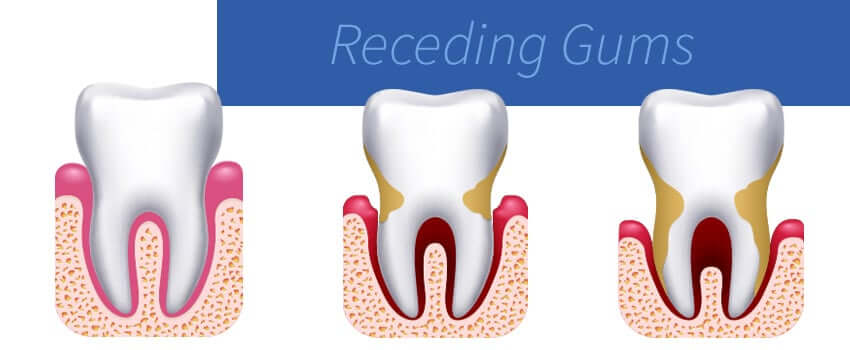Have you ever noticed your gums feeling sore or more recessed than usual? Maybe you’ve even experienced bleeding while brushing your teeth. If so, you may be dealing with receding gums. Take the case of John, a 45-year-old man who recently began to notice his gums were starting to pull away from his teeth. He became concerned and wanted to know what he could do to prevent them from getting worse. Luckily, you can take steps at home to address this issue and prevent further damage. In this article, we’ll explore tips for How to Stop Receding Gums from worsening and promoting gum health naturally.

Understanding the Causes of Receding Gums
So, you’re wondering why your gums are receding? It could be caused by various things, such as brushing too hard or not flossing regularly. Common causes include gum disease, genetics, hormonal changes, and smoking.

Preventing gum recession starts with identifying early warning signs. These can include tooth sensitivity, visible roots of teeth, and bleeding gums. If you notice any of these symptoms or have concerns about the health of your gums, it’s essential to see a dentist for an evaluation. Catching gum recession early can help prevent further damage and allow for effective treatment options.
Good Oral Hygiene: how to stop receding gums
Regularly brushing and flossing can keep your pearly whites shining bright. And remember to schedule those dental check-ups! Practicing good oral hygiene habits is crucial in preventing receding gums from worsening. When it comes to flossing, it’s essential to use the correct technique. Start with an 18-inch piece of floss and wrap it around your middle fingers, leaving about two inches to work with. Gently glide the floss between each tooth in a back-and-forth motion, also cleaning below the gum line.

In addition to proper brushing and flossing techniques, incorporating mouthwash into your routine can help prevent receding gums from worsening. There are several options available such as antibacterial mouthwash or fluoride rinse. It’s essential to choose one that fits your specific needs and preferences. Using mouthwash after brushing and flossing can help kill bacteria hiding in hard-to-reach areas of your mouth and freshen up your breath simultaneously. By practicing these simple steps regularly, you’ll be well on your way toward healthier gums and a brighter smile!
| FLOSSING TECHNIQUES | MOUTHWASH OPTIONS |
|---|---|
| Use an 18-inch piece of floss | Antibacterial Mouthwash |
| Wrap it around middle fingers | Fluoride Rinse |
| Clean between each tooth | Choose according to needs |
Using Natural Remedies to Promote Gum Health
You are looking for a more natural way to promote healthy gums? Try incorporating some of these easy remedies into your daily routine! One popular method is oil pulling, which involves swishing a tablespoon of coconut or sesame oil in your mouth for about 15 minutes before spitting it out. This practice has been shown to reduce bacteria and inflammation in the mouth, helping prevent gum disease and promote oral health.

Another option is herbal mouthwash recipes made from sage, peppermint, and chamomile. These herbs have anti-inflammatory properties that help soothe sore gums and reduce redness and swelling. To make an essential herbal mouthwash, steep one teaspoon of dried herbs in a cup of hot water for about 10 minutes, then strain and use regular mouthwash. With just a few simple steps, you can incorporate these natural remedies into your daily routine to help keep your gums healthy and strong.
Making Lifestyle Changes for Better Oral Health
You can quickly improve your oral health by making simple lifestyle changes, such as cutting back on sugary drinks and snacks. This means avoiding soda, candy, and other sweets that can increase the risk of gum disease. Instead, opt for water or unsweetened beverages and choose healthier snacks like fruits, vegetables, or nuts.

In addition to dietary modifications, stress management is also essential for maintaining good oral health. Stress can lead to clenching or grinding teeth, which can cause damage to gums over time. Relaxation techniques such as yoga or meditation can help reduce stress levels and promote better oral health. By making these lifestyle changes, you will proactively prevent further gum recession and promote optimal oral health.
Seeking Professional Treatment for Severe Cases
If your gum recession has become severe, it’s time to seek professional treatment from a dentist or periodontist who can provide specialized care and help prevent further damage. Dental procedures such as scaling and root planing can remove plaque and bacteria buildup contributing to gum disease. This involves removing tartar from the teeth and smoothing out rough spots on the roots of teeth to eliminate any pockets where bacteria may thrive.

In some cases, surgical options may be necessary to restore your gums’ health. Gum grafting involves taking tissue from another area of your mouth or using synthetic material to cover exposed roots and strengthen the gums. Another option is flap surgery, which involves lifting back the gums to clean out any infected tissue before securing them in place again. You can reverse the effects of severe gum recession and maintain a healthy smile for years with proper treatment and care.
For More Info Visit
Final Verdict
Congratulations! You have taken the first step towards healthier gums by reading this article. By now, you understand that receding gums are a common problem that can lead to tooth sensitivity, decay, and even tooth loss. But don’t worry; there are many effective ways to prevent and treat receding gums from getting worse.
Did you know that according to the American Dental Association (ADA), 47% of adults over 30 have some form of gum disease? This statistic highlights oral health’s importance in preventing gum problems like receding gums. Remember, practicing good oral hygiene habits such as brushing twice daily, flossing daily, and using mouthwash can go a long way in preventing gum disease and keeping your gums healthy.

In addition to good oral hygiene habits, incorporating natural remedies like oil pulling or using green tea may also help promote gum health. Lifestyle changes such as quitting smoking and eating a balanced diet can also improve oral health. If you experience severe cases of receding gums despite your best efforts at home, seeking professional treatment from a dental professional who can provide specialized care is essential. How to Stop Receding Gums .
By implementing these tips and making small changes in your daily routine, you can stop receding gums from worsening at home and maintain healthy teeth and gums for years. Remember – prevention is key!

